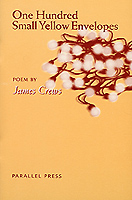Book Review
One Hundred Small Yellow Envelopes by James Crews. Madison, Wisconsin: Parallel Press, 2009.
http://parallelpress.library.wisc.edu/chapbooks/poetry/
Reviewed by Noel Sloboda
The twenty poems in James Crews’s One Hundred Small Yellow Envelopes produce a synergy that makes this chapbook resonate with the power of a full-length collection. A loose narrative underpins the volume: most of the works feature the voice of Cuban-born artist Felix Gonzales-Torres reflecting on the great love he shared (and lost) with Ross, “a man I was willing / to follow down these streets.”
AIDS took both men—first Ross, then Felix—and mortality is a pressing concern throughout the chapbook. It moves from the first charged meeting of the couple into their courtship, then through the stages of Ross’s decline. It closes during the mourning period following his death. In poem after poem, Felix pours over tangible evidence of Ross’s existence, from “the clothes he’d given up” to “old newspapers, stacked waist-high” that the couple had saved to mark the time. Faced with the reality of his lover dying, Felix valiantly struggles to capture what might endure once Ross is gone: something transcendent, “up, up, up,” beyond the world in which “we humans” dwell.
Despite the subject matter, Crews is never morbid and rarely sentimental. Felix revels in sensual moments, from picking blackberries to tugging down bed sheets that conceal Ross’s nakedness. The bond between the two men intensifies as they share deeply felt experiences of beauty in art museums (“The Gold Field”), in the countryside (“Wawanaisa Lake”), and in their home (“Nowhere Better Than This Place”).
In a few of the poems, Ross is heard—though never directly, since he speaks to a sleeping Felix or sets words down on paper. Crews thus keeps the voice of Ross partially muted, suggesting how AIDS can strangle its victims. In “Letter to Felix: Ross,” Crews likens the dying man to Keats: passionate but never given time to develop fully, or to express “everything he’d ever meant to say / but had saved and saved for later.”
While Crews displays great skill with free verse, he is at his best in prose poems such as “Last Light” and “Orpheus Twice.” The continuous lines accent the urgency of living with a heightened awareness of the clock. Many of these poems track the rising and setting of the sun, while trying to seize the fleeting daylight hours in between, when moments of intimacy are enjoyed—or missed. In “Orpheus Twice,” Felix catches
a flash of sunlight in the mirror, and your naked silhouette standing in front of it. Come back to bed, I said. But you kept staring into the silver skin of your reflection, as if transfixed by the music, you wouldn’t move. Or couldn’t.
The glimmer of lost opportunity recurs in “Last Light,” the penultimate poem in the volume: “When the sun went down, I let the skillet burn black. I couldn’t cook. I ached, insane for the light to come again."
Yet amidst such dark scenes, these poems transfigure the couple. Crews makes Felix and Ross into beautiful images, providing a measure of compensation—however incomplete—for what was lost when they died. The poet positions himself as a visual artist, standing alongside Felix, as he imagines Ross as “Giotto’s Lazarus standing outside his tomb: the linen of his death shroud still binding him, reminding him.” Readers of this fine collection will similarly be left with reminders of death’s immanence, and, at the same time, with reminders of our shared “wish” for something that outlasts our brief, fragile lives.
Noel Sloboda lives in Pennsylvania, where he teaches at Penn State York and serves as dramaturg for the Harrisburg Shakespeare Festival. He is the author of the poetry collection Shell Games (sunnyoutside, 2008). Sloboda's postcard poem, "From the Machine," is part of the Poetry Jumps Off the Shelf feature.


